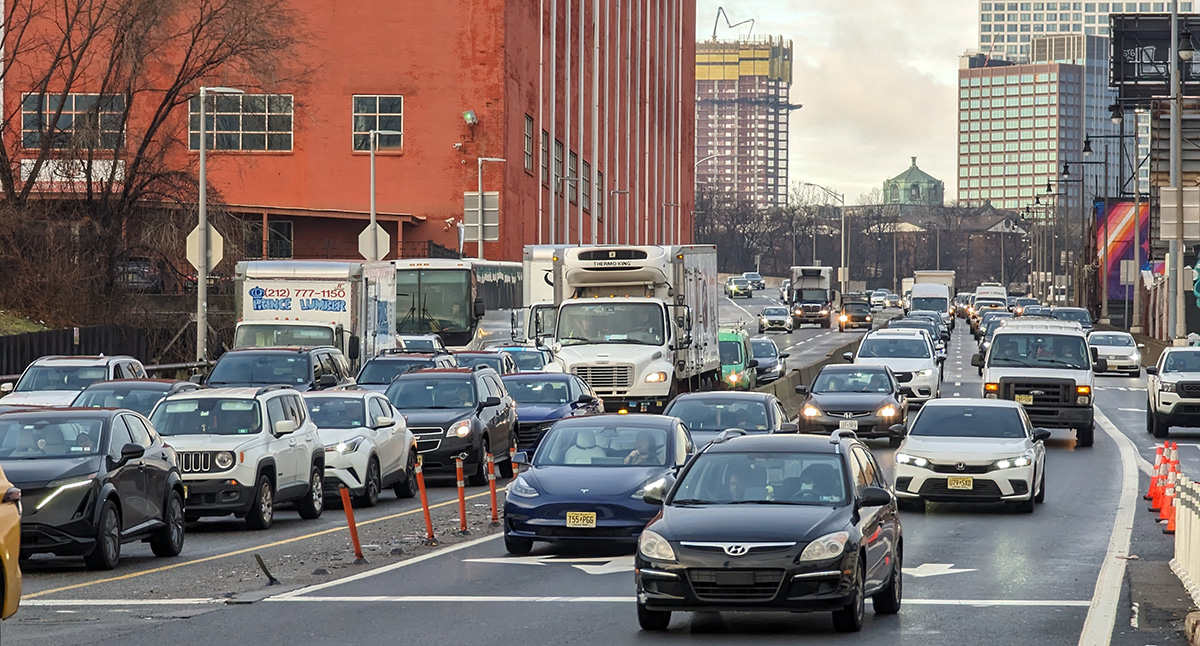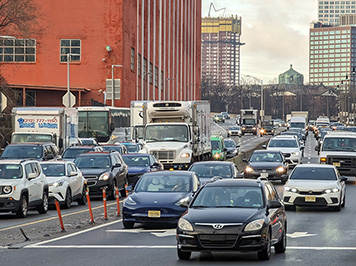34 groups, including the Fund for a Better Waterfront, file an Amicus brief in federal court

New Jersey traffic headed to the entrance of the Holland Tunnel.
FBW | January 3, 2024
The Central Business District (CBD) Tolling Program, also known as the congestion pricing plan, would charge $15 to cars entering Manhattan below 60th Street. The fee would apply on weekdays from 5 a.m. to 9 p.m. and on weekends from 8 a.m. to 9 p.m. The price for trucks would range from $24 to $36 depending on their size.
According to the Metropolitan Transportation Authority (MTA), this program could reduce the number of cars in the CBD by as much as 20 percent or 143,000 vehicles. Truck traffic would decline even more dramatically. Air quality in lower Manhattan would improve significantly as well as the quality of life. The plan will reduce the number of vehicle crashes and make streets safer for pedestrians and cyclists as well as cars. In addition, the program will generate $1 billion annually to invest in capital improvements for train, bus and subway infrastructure. The program provides powerful incentives for commuters to opt for public transit rather than cars.
Hudson County residents who suffer the negative impacts of daily traffic traversing the Lincoln and Holland Tunnels will also enjoy the advantages of less traffic and diminished carbon emissions. New Jersey commuters will also benefit from an improved New York City transit system as they make connections from trains and buses entering Manhattan.
Congestion pricing, however, has its detractors. New Jersey Gov. Phil Murphy is one. In July, the State of New Jersey filed suit in U.S. District Court challenging the Federal Highway Administration approval of the New York City congestion pricing plan claiming the program places an unfair financial and environmental burden on New Jersey residents.
Thirty-four New Jersey environmental, labor and civic groups, however, strongly disagree with their governor. In December, they filed an Amicus brief in opposition to the State’s litigation. The Fund for a Better Waterfront joined in the court action along with NJ Citizen Action, Clean Water Action, Empower NJ, NJ Work Environmental Council, Hudson County Complete Streets, SafeStreetsJC, Bike Hoboken and 26 other groups.
In addition to stating the obvious benefits of congestion pricing, the brief also argues, “Congestion pricing will help New Jersey meet its goal of reducing greenhouse gas emissions by 50% by 2030” and “NJ Transit is in perilous financial condition, facing a nearly $1 billion revenue shortfall in 2026. The Tolling Program will incentivize the use of public transportation and provide much-needed revenue for NJ Transit.”
The brief also calls out the apparent contradiction in Gov. Murphy’s suit on environmental grounds and his support of the hotly contested New Jersey Turnpike widening plan, costing $11 billion to widen 8 miles of the turnpike leading to the bottleneck at the Holland Tunnel entrance.
A heated debate over the congestion pricing program in New York City has extended for over two decades. Mayor Michael Bloomberg proposed a formal plan in 2007 but the state legislature did not approve the program until 2019. In 2023, the federal government approved New York City’s plan and public hearings will take place in the coming months of 2024. Details about discounts and exemptions are still being worked out.
New York City’s Tolling Program would be the first congestion pricing plan to be implemented in the United States. London, Stockholm and Singapore have all had plans operational for a number of years. All three of these overseas cities had to overcome stiff opposition initially and continue to fine-tune how the program works. New York City is also expected to make adjustments after analyzing the results of the Tolling Program once it is operational.


